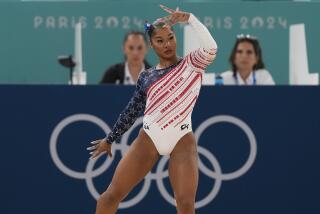Nonconformist Is Making Waves
- Share via
TOKYO — Is she just too un-Japanese to represent Japan in the Olympics?
That’s the question that Suzu Chiba and her supporters have been asking since the outspoken swimmer won her qualifying event and national title but nevertheless was denied a spot on the swimming team that will represent Japan at Sydney.
Chiba isn’t keeping her frustrations to herself, either, a most un-Japanese thing to do. She reportedly is the first Japanese athlete to appeal such a decision, charging that her rejection has nothing to do with swimming.
“I might not conform to their ideal image, but that doesn’t mean they shouldn’t select me,” the 24-year-old declared at a recent news conference.
Although Chiba declined to elaborate and couldn’t be reached for comment, some sports watchers suggest that she is too outspoken in a country whose residents tend to keep true feelings, known as honne, hidden behind the tatamae, or public face.
She also is said to upset the all-important Japanese wa, or team harmony, by being immodest and offensive to younger colleagues. She doesn’t win any points, either, by training outside Japan, in Canada, with an American coach.
Particularly egregious was Chiba’s comment at the 1996 Atlanta Games that she wanted to “enjoy the Olympics.”
“That creates some misunderstanding,” Tsutomu Hayashi, honorary secretary of Japan’s swimming federation, said in a telephone interview. Chiba has criticized Japan for being too “medal-hungry.”
Medal-hungry it is, Hayashi says, and the pressure is particularly intense for swimmers, who placed no higher than 13th in Atlanta and earned no medals--a performance branded by the Japanese media as a “humiliating defeat.”
In other sports, the scrutiny isn’t as intense.
No one disputes Chiba’s potential: In 1999, she set a national record in the 200-meter freestyle in a time that would have placed her second in the world.
But the federation said Chiba just hasn’t been trying hard enough this year.
“There’s no hope for Chiba to win a medal, and her record was below the threshold to win a medal,” Hayashi said. “We expected her to perform much better in the race.”
Chiba won the 200-meter freestyle qualifier in April in 2:00.54 minutes, beating the Olympic qualifying standard of 2:01.02. But she placed third in the 100-meter freestyle, so the federation chose the winner of the 100-meter race, Sumika Miyamoto, to represent Japan in both Olympic events.
The federation could have selected more team members, as it did in past years, but said it wanted a small, highly motivated team.
“We wanted to create a better environment and a good team so that swimmers can win medals,” Hayashi said.
In late June, the Court of Arbitration for Sport, an independent review panel in Switzerland, agreed to hear Chiba’s appeal. A hearing date hasn’t been set.
Meanwhile, Chiba has alienated some would-be supporters by saying that she’s not even sure she will bother competing if she wins the appeal.
Nevertheless, many are hoping that her actions encourage accountability.
“Because of a tendency not to challenge authority in Japan, there are many other players who swallowed such insults in the past,” said Mitsunori Urushibara, a professor of sports sociology at Shikoku Gakuin University. “We need an explanation which everyone is satisfied with and is democratic.”
Daichi Suzuki, a swimmer who brought home an Olympic gold medal for Japan in 1988, said he often experienced problems as a young swimmer.
“I could not confront the organization or authority, which was like a wall,” said Suzuki, who now lectures and coaches swimmers at Juntendo University. “Even though people knew that the judgment was based on some misguided rules, they ended up thinking, ‘I will do better in the next race or game rather than complaining.’ ”
Suzuki, who also served as a guest coach at Harvard for two years, says Americans tend to be more individualistic than Japanese but, perhaps ironically, that produces a more desired effect.
“American swimmers are very harmonious,” he said. “In the U.S., strong individualities create a much stronger wa.
“In Japan, once someone breaks the conformity, he or she is treated as a heretic. It’s OK as long as that person achieves the goal, like winning a gold medal, but she will receive severe criticism if she fails.”
*
Hisako Ueno of the Times’ Tokyo bureau contributed to this report.
More to Read
Go beyond the scoreboard
Get the latest on L.A.'s teams in the daily Sports Report newsletter.
You may occasionally receive promotional content from the Los Angeles Times.






